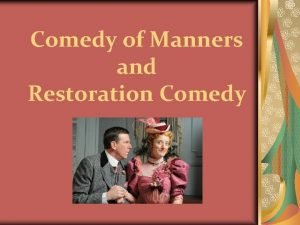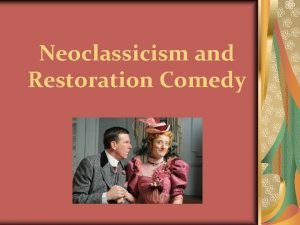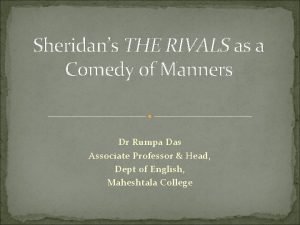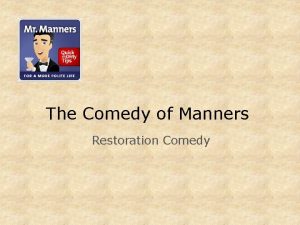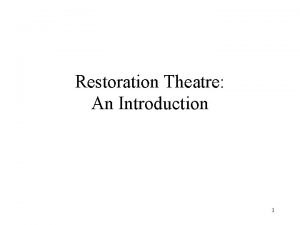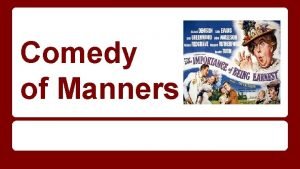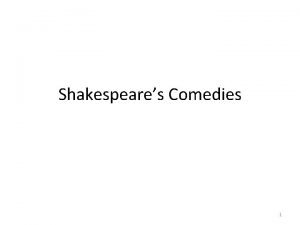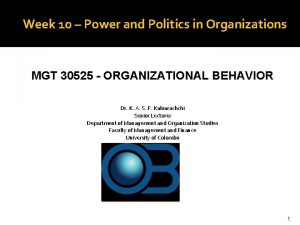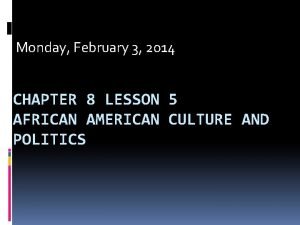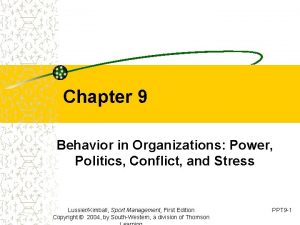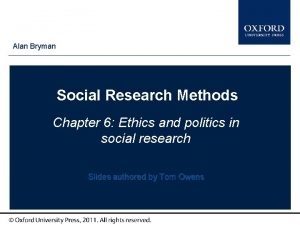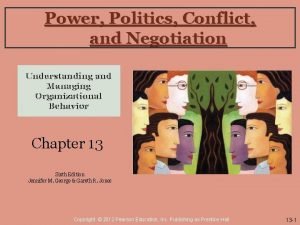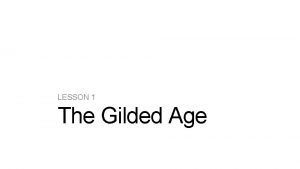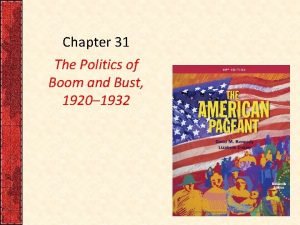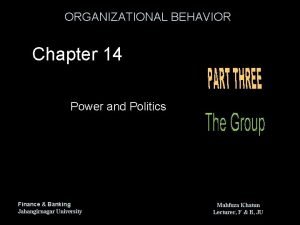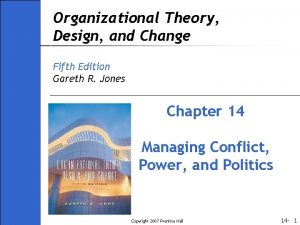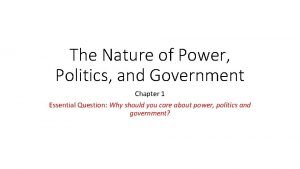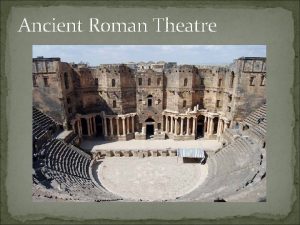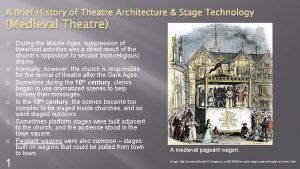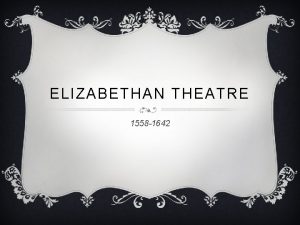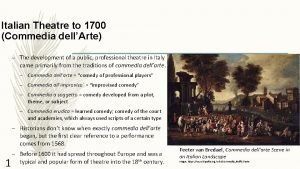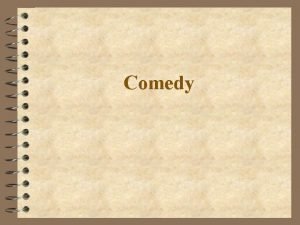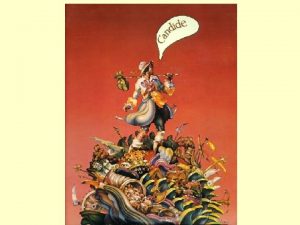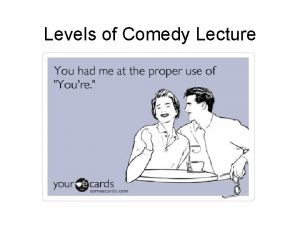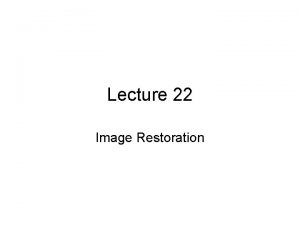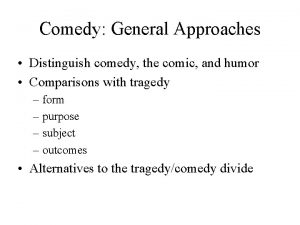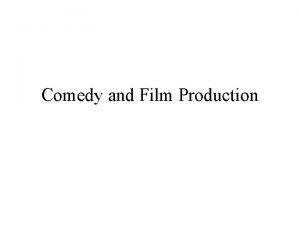Politics and Theatre History RESTORATION THEATRE Comedy of









































- Slides: 41

Politics and Theatre History RESTORATION THEATRE Comedy of Manners 1660 -1700

I. English Civil War Charles I Oliver Cromwell Charles II

Charles I (1600 -1649) was King of England, Scotland Ireland from 1625 until his execution in 1649. During the English Civil War, Charles I was opposed by the forces of Parliament (which challenged his attempts to gain more power) and by Puritans (who were against his religious policies).

The war ended in defeat for Charles. He was tried, convicted and executed for high treason. Before Charles I was beheaded, his son Charles II, fled to France.

When the monarchy was overthrown, power was assumed by Oliver Cromwell, outspoken member of Parliament and Lord General of the Parliamentary Army that had defeated Charles I.

While in France, Charles II was exposed to theatre supported by King Louis XIV. In 1658, Moliẻre, one of France’s most respected playwrights, performed for the first time for Louis XIV and his court in the Louvre Palace. Perhaps Charles II was there!

Moliẻre (Jean-Baptiste Poquelin) 1622 -1673

Louis XIV

Moliere and Louis XIV at Court

Some of Moliere’s plays include: The Miser The School for Wives The Imaginary Invalid and Tartuffe

The School for Wives by Moliere

The School for Wives

Meanwhile, England became a “republic” under Cromwell, who was really another monarch in all but name. Due to his Puritan beliefs, theatre was outlawed as immoral. Cromwell’s regime became dependent on the army and was in effect a military dictatorship.

When Oliver Cromwell died in 1658, his ineffectual son Richard Cromwell succeeded him, and the demand for the restoration of royalty grew.

At the age of thirty, Charles II returned from France and restored the monarchy in 1660. A patron of the arts, Charles II was known as the “Merry Monarch. ” After 18 years of the Puritan ban on theatre, Charles II reopened theatres and influenced theatre style to reflect all he had seen in France.



Charles II Louis XIV

Charles II Louis XIV

Charles II allowed women to act on stage for the first time in England. Men who had previously been playing the women’s roles had to adapt to the men’s roles or find other work. Charles II and his queen had no children, but he sired several children by a number of mistresses. One of his favorite mistresses was actress Nell Gwyn.

II. Restoration Comedy English Comedies, written and performed in the Restoration period from 1660 -1700, were famous for sexual explicitness. This was to reverse Puritan sobriety and to reflect what Charles II had seen in French theatre during his years in exile in the French court.

Predominantly male audiences delighted in seeing real women engage in risquẻ repartee and take part in seduction scenes.

RESTORATION COMEDY OF MANNERS Characteristics • Witty dialogue-saying things in clever ways • Sophisticated sexual behavior of the highly artificial aristocrats

• Honor comes from reputation, not integrity • Advantage comes from catching a lover or cuckolding a husband without getting caught

Goals of Comedy of Manners • Mock society • Scrutinize social pretension • Encourage audience to laugh at themselves and society Themes • Marriage • Games of love

A second wave of “softer” Restoration comedy developed in 1690’s. Playwrights wanted to appeal to the middle-class and women audience members. Around 1700, the amoral and aristocratic plays of the earlier period became unpopular and the Neoclassical concept of teaching morals returned.

Some Playwrights of the Restoration William Wycherley- The Country Wife George Etheridge- She Would If She Could Aphra Behn (first professional British woman playwright)-The Forced Marriage and The Rover William Congreve- The Way of the World

Women in Restoration Theatre Aphra Behn-Playwright • Wrote over 20 plays. • Created strong female characters within the constraints of male dominated society. • Spy for Charles II, warned of Dutch plan to send fleet up the Thames.

Margaret Hughes: • One of England’s first actresses. • Samuel Pepys wrote about her performance in his famous diary. • Is thought to have played Desdemona (The Moor of Venice/Othello), the first time a woman rather than a man had appeared in the part.

Nell Gwyn: • One of the most famous actresses of the time. • Played Angelica Bianca in Aphra Behn’s play The Rover. • Mistress of Charles II

Mary Saunderson Betterton: • Managed the successful Duke’s Company with her husband Thomas Betterton. • Actress Henrietta Maria Davenant: • Managed the Dorset Garden Theatre. • Mentored young actresses and actors. • Gave young actresses lodging in her home when they had no money.

Other Important People of the Time Thomas Betterton: Actor & Manager • Played every great male role. • Managed as a team with his wife. Samuel Pepys: Member of Parliament • Loved theatre • Kept diary that served as primary of source of information on the period.

Edward Kynaston: Actor • Samuel Pepys wrote in his diary, “the loveliest lady that I have ever seen. ” • One of the last Restoration actors to play women’s roles. • Made a successful career in male roles after men were not to play women’s roles. • Noted for portrayal of Shakespeare’s Henry IV.

Even during the years when theatre was outlawed, boys were secretly trained to play the women’s roles in hopes that theatres would reopen. Edward (Ned) Kynaston likely received years of challenging training to convincing play the women’s roles on stage.

Summary: Restoration Comedy of Manners Theatre is a direct result of the politics in England during the time period. If Charles I hadn’t been defeated by Cromwell, and theatre’s hadn’t been closed, and Charles II hadn’t been exiled to France where Moliẻre was writing, directing and acting for Louis XIV, Comedy of Manners in England would likely not have developed as it did.

The Restoration Theatre time period continues to fascinate. The following photos are from Jeffrey Hatcher’s 2004 film Stage Beauty with Billy Crudup, Claire Danes and Rupert Everett. He adapted the screenplay from his stage play Compleat Female Stage Beauty. Hatcher’s script began with Samuel Pepy’s diary!





Sources: Cambridge U. Press, Northern Virginia Community College, Encyclopaedia Britannica, Timeline. html, Wikipedia Encyclopaedia, Towson. edu. , Imagi-nation. com, Visit Voltaire. com, Encartamsc. com. , Groucher. edu, Classiclit. com, www. fact. index, Timothy Mooney, Theatre History. com, enotes. com, Movies. about. com, Movienet. com,
 Comedy of manners theatre
Comedy of manners theatre Examples of comedy of manners
Examples of comedy of manners The rivals comedy of manners
The rivals comedy of manners Comedy of manners in restoration age
Comedy of manners in restoration age Karin kovar
Karin kovar Comedy of manners examples
Comedy of manners examples What is the shared history of theatre and games
What is the shared history of theatre and games Romeo and juliet comedy
Romeo and juliet comedy Comedy codes and conventions
Comedy codes and conventions Codes and conventions of comedy
Codes and conventions of comedy The tom and jerry comedy show
The tom and jerry comedy show Power and politics in organizations
Power and politics in organizations Five opportunities in media and information
Five opportunities in media and information Chapter 8 lesson 5 african american culture and politics
Chapter 8 lesson 5 african american culture and politics Bureaucracy and politics in india
Bureaucracy and politics in india Power politics and conflict in organizations
Power politics and conflict in organizations Ethics and politics in social research bryman
Ethics and politics in social research bryman Conflict power and politics
Conflict power and politics Philosophy, politics and economics michael munger
Philosophy, politics and economics michael munger The tournament of today
The tournament of today Chapter 31 the politics of boom and bust
Chapter 31 the politics of boom and bust Whose government politics populists and progressives
Whose government politics populists and progressives Politics and international relations bsc
Politics and international relations bsc Ap government and politics unit 1 study guide
Ap government and politics unit 1 study guide Politics and law atar
Politics and law atar Relationship between sport and politics
Relationship between sport and politics Politics and the english language
Politics and the english language Contrasting leadership and power
Contrasting leadership and power Power and politics organization theory
Power and politics organization theory Power and politics
Power and politics The nature of power politics and government
The nature of power politics and government Looking at theatre history
Looking at theatre history The globe theater history
The globe theater history Italian renaissance theatre history
Italian renaissance theatre history Ancient roman plays
Ancient roman plays History of theatre architecture
History of theatre architecture What is physical theatre
What is physical theatre French renaissance theatre history
French renaissance theatre history Ancient greek theatre history
Ancient greek theatre history History of elizabethan drama
History of elizabethan drama George bernard shaw naturalism
George bernard shaw naturalism Italian theatre history
Italian theatre history
